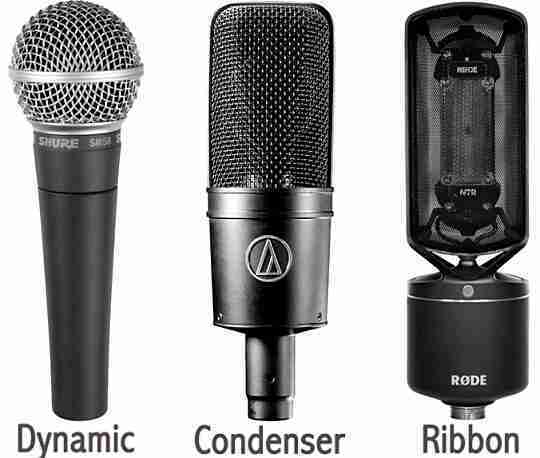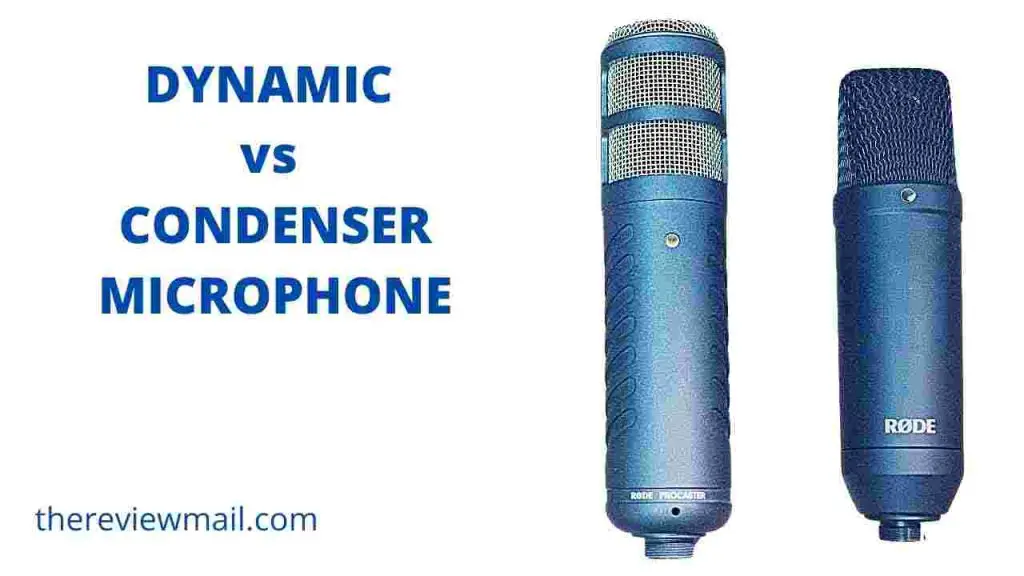Is a condenser mic good for vocals? A condenser microphone is one of the most popular names among vocalists; it is also known as a capacitor microphone. Though you can see different types of mics for recording in the market, but all of them are not perfect for recording songs.
When most singers are looking for the best microphone to get more detail, natural-sounding vocals performance, then the name of the condenser microphone comes first. But many people are still a bit about the confusion that, is a condenser mic good for vocals?
Basically, we have made this round-up guide keeping their remarks in mind, where we have discussed in detail all about the Cardioid condenser microphone and compared the recording performance of condenser mics with other mics. So let’s start with the basics.
Also Read : Best Affordable Condenser Mic For Vocals
Table of Contents
Types of Microphones
For vocal production, you can see 3 different types of mics in the market; before we go to our main part, let’s get acquainted with these mics.

- Dynamic Mics
- Condenser Mics
- Ribbon Mics
Each microphone has different specifications, strengths, advantages, and disadvantages.
However, dynamic microphones and condenser microphones are very popular for vocal recording. As well as in the market, you will see there is comprehensive comparison between dynamic mic vs condenser mic, and most buyers confuse about which of the two will be best for them.
Dynamic vs Condenser Microphone!

In this section, we will briefly highlight the differences between the dynamic and condenser mics so that you can understand the main parts. Furthermore, this brief comparison will help you understand the next steps more easily.
Condenser and dynamic are completely different in built quality and function.
In short, the dynamic microphone is highly durable, as well as one of its best advantages is that it can handle higher volumes without any distortion.
On the other hand, condenser microphones are used for more precise sound and more crisp recording. It is suitable for song recording in detail; you can see a condenser’s most vocal USB mics on the market.
Many people use dynamic microphones for home vocal recording, but most singers accept that a condenser microphone is the best option in this case. This is because dynamic microphones are basically the best option for noisy or places that require better SPL (Sound Pressure Level) places.
A condenser microphone is an excellent option for overall studio vocals recording; on the other hand, a dynamic microphone is a perfect option for stage recording.
When to Use a Condenser Microphone?
After the comparison, you may know in which case the condenser microphone usage! Basically, many people prefer sonic detail vocals, so it isn’t easy to find an alternative to condenser mics.
And in the market, you can see these two types of condenser microphones: small diaphragm and large diaphragm. Both microphones are used on completely different occasions.
Small diaphragm microphones are smaller, much thinner, and pencil-shape, which you can see in the below image; on the other hand, the large-diaphragm condenser microphone is bigger. If you take a fair look at the image below, you can easily understand the difference.

If you look at the small diaphragm microphone, for example, Audio Technica AT2021, you will see the actual mic towards the end, which means you point to the sound source to take the signal.
On the other hand, a large-diaphragm microphone does not have the same standing. Instead, it is typically placed parallel to the source. Though smaller diaphragm condenser microphones can better pick up transients, they also have a more comprehensive frequency response with a more consistent polar pattern.
But the large-diaphragm mic is ahead of the small diaphragm for the reason that it’s better noise performance, which makes it the best for recording vocals.
For example, the Audio Technica AT2035 large-diaphragm microphone is designed to be perfect for vocalists. This mic provides a better low-end frequency response and a smooth look.
Also Read: Best Condenser Mic Under 200 USD
Is a Condenser Mic Good for Vocals?
Now the main question is, is a condenser microphone good for vocal recording? In short, the answer is Yes.
Due to the lightweight membrane of this condenser microphone, it is highly sensitive, which makes it a perfect option for higher range frequency and proper recording in vocals, drum overheads, acoustic guitar, brass instrument, and studio situations.
Large-diaphragm condenser microphones are great for professional vocals, and if you want, you can use it for multi-purpose recording.
Also Read: How to Connect Condenser Mic to Speaker?
how does a condenser microphone work?
If you’re looking to take your audio recording and mixing skills to the next level, you’ll want to learn about condenser microphones. These microphones are designed to capture high-quality audio recordings and mixes, and they offer some great benefits that you won’t find with other types of microphones. So why is this type of microphone such a good choice for recording? we’ll explain how a condenser microphone works? & how to use a condenser mic for recording vocals, so be sure to check it out!
- A condenser microphone is a type of microphone that uses a metal diaphragm to condense sound waves.
- This results in better sound quality as the microphone captures more of the details in the sound.
- It is also less likely to capture noise and unwanted sounds.
- A condenser microphone is usually larger and heavier as compared to a dynamic microphone.
- It has an electric motor that moves the diaphragm, which in turn converts sound from the air into an electrical signal.
Read More about How Does a Condenser Microphone Work?
Condenser Microphone Problems and Solution!
Condenser microphone problems can occur for a variety of reasons, but the most common are due to dust, moisture, or corrosion. If dust is getting into the microphone, it can cause static and distorted audio. Moisture can cause damage to the electronics or construction of the microphone, while corrosion can cause the metal parts to corrode.
If you are experiencing condenser microphone problems, the best thing to do is to remove the microphone and clean it thoroughly. This can be done with a mild soap and water, or a commercial cleaning solution such as Deoxit. Once the microphone is clean, put it back together and check to see if the problem has been resolved. If not, you may need to take it in for repairs. Read More about Condenser Microphone Problems and Solution.
FAQs: Frequently Asked Questions
1. What is a condenser microphone?
A condenser microphone is usage for high frequency and vocal capture. It prefers for most studio applications. However, it is primarily known to professional singers for its detail and accuracy.
Condenser mics are constructed with a lightweight diaphragm, due to which it is susceptible, and the fixed plate is suspended. As a result, this microphone is best for acoustic guitar, vocals, and drum overheads, but not for louder sound. In this case, a dynamic microphone is an excellent option for louder sounds.
2. Do singers use condenser microphones?
The short answer is, ‘Yes,’ singers especially prefer large condenser microphones in their studio vocals recording because, especially for vocalists, it provides better performance than a dynamic microphone.
3. Why Condenser Mics are Good for Recording Vocals?
There are a number of reasons why condenser microphones are called the most suitable for recording vocals. Especially if you want vocal recording performance in a lot more detail, then it will help you fully to get more natural and detailed vocals; this will also help you to get the feeling of listening to music directly from a real person while listening to the recording.
Also Read: How to Connect a Condenser Mic to a Pc?
Final Verdict
Undoubtedly, a condenser microphone is the best microphone for professional-level studio vocals capture. It helps you record natural and clear vocals; its simple mechanical system also allows you to use it in live lyrics.
Hopefully, our complete guide has helped you a lot to find the right answer to your query, is a condenser mic good for vocals. In addition, we’ve shared some more relevant questions; hopefully, this has helped you to know more than just your inquiries.
Also Read: How to connect condenser mic to Mac?

Williams Kane is a blogger and writer. He’s passionate about writing and connecting with the community, especially when it comes to sharing his ideas through writing.
I am a versatile author with a passion for exploring a wide range of topics on our multi-niche website. With a background in research and a love for writing, I bring a unique blend of expertise to our platform.
My journey began in the world of science, where I earned a degree in biology and developed a deep fascination for the natural world. This background enables me to delve into topics related to ecology, environmental conservation, and the wonders of the animal kingdom.
However, my curiosity knows no bounds, and I have ventured into various other niches as well. From technology trends and digital innovations to health and wellness tips, I strive to provide well-researched and engaging content that informs and entertains our diverse audience.
Furthermore, my dedication to staying current with the latest developments in each niche ensures that our readers receive up-to-date and reliable information. Whether it’s deciphering complex scientific concepts or simplifying tech jargon, I take pride in making complex subjects accessible to all.
Join me on our multi-niche journey, where we explore the depths of knowledge and share insights on a multitude of topics to inspire, educate, and entertain.
